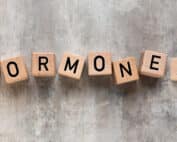What is the REAL risk of breast cancer with hormone replacement? Many women who suffer from menopausal symptoms avoid Hormone Replacement Therapy (HRT) due to the risk of breast cancer. While osteoporosis and cardiovascular disease are far more prevalent, and hormone replacement therapy may have a beneficial effect in alleviating or preventing these conditions, the fear of breast cancer prevents women from seeking treatment.
The Women’s Health Initiative
Most of the information that planted this fear is old and came from the Women’s Health Initiative Study. In that study the average age of women was 63, they were on high doses of synthetic hormones given by mouth and were 10 years past menopause. Once the data was analyzed in a different way looking at subpopulations, for example younger women, or women who started hormones within 5-10 years of menopause as well as the rate of breast cancer in the control group, things looked very different. In that study
- The control group had a lower risk of breast cancer than the general population which skewed the data and inflated the risk.
- In fact, the curve of the rate of breast cancer for women on hormones who started early was the same as that in the general population!
- Also, women on estrogen alone in that study had a lower risk of breast cancer.
This 2002 study of 10 000 women in the hormone group there were only:
- 8 additional cases of breast cancer
- 6 less cases of colon cancer
- 6 less hip fractures
- 5% of women on treatment had no adverse events.
Women under 60 and less than 10 years after menopause when starting hormones had the most beneficial effects with the least risk.
2020 British Research Study
A study in Britain of more than half a million women put things in perspective.
- No increase in risk of breast cancer in women taking HRT taken for less than a year.
- The risks of breast cancer increased if taken for longer than five years.
- The risks then declined once the HRT was stopped.
- Five years after stopping, there was no increase in breast cancer risk for women who had taken combined HRT for less than five years.
Age, Time and Type of Hormone Matters!
The age you start taking hormone replacement therapy made a difference.
- There was a lower risk for women in their 50s, compared to those in their 60s and 70s
- Taking HRT less than 5 years lowered the risk
- The type of progestin changed the risk with norethisterone having the highest risk and dydrogesterone the lowest.
The Numbers
Women who had never taken HRT would still get breast cancer.
- If a group of 10,000 women in their 50s had never taken HRT, 26 women would still get breast cancer in a year.
- If all 10,000 women had recently taken combined HRT for less than 5 years, 35 would get breast cancer.
The HRT group would only have 9 extra cases of breast cancer in a year. That is less than one in a thousand women!
French Women’s Study
In most of the other studies the use of bioidentical progesterone was not used or was rare. The French study most women used micronized progesterone otherwise known as natural or bioidentical progesterone as opposed to a progestin which is synthetic. They also used estrogen trans dermally meaning given through the skin, so it decreased the risk of clots.
- The risk of developing breast cancer using bioidentical estrogen plus natural progesterone is lower in the first 2 years, about the same in the first 4-5 years and rises to 1.26, thereafter.
- Bioidentical estrogen and synthetic progestogen has an increased risk of 1.36 in the first 2 years, 1.56 in the first 4-5 years and increases to over 1.79 after 6 years.
The type of progesterone matters. Be aware that some reports call synthetic progestin or progestogens by the name progesterone. Only progesterone is the same as your body makes. If it is called norethidrone or medroxyprogesterone or anything other than progesterone, it is synthetic.
Looking at the E3N data Fournier found in over 50, 000 postmenopausal women on HRT
- Progestin increased risk of breast cancer by 1.4
- Progesterone reduced the risk of breast cancer by 0.9
The bottom line is that there is a risk of breast cancer with or without hormones. The earlier you start hormones the better. You can decrease the risk by taking estrogen through the skin and natural bioidentical progesterone for 5 years or less. The age, type and route of administration matter. Be sure to have an evaluation with someone with expertise in bioidentical hormone replacement therapy who can help you put the risks and benefits in perspective.






She is a recognized and award-winning holistic, functional, integrative and anti-aging healthcare practitioner, speaker and author, and has been featured in ABC News, Forbes, WOR Radio and many media outlets to spread the word that you can live younger and healthier at any age.